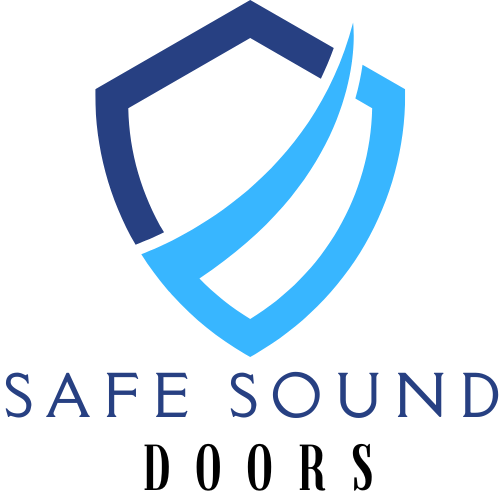Share
Crafting a Tranquil Space: Best Soundproof Doors for Recording Studios
Estimated Reading Time: 6 minutes

The Importance of Soundproofing in Recording Studios
In a recording studio, sound quality is paramount. Whether you're recording music, podcasts, or voiceovers, controlling sound is essential to ensure the best possible output. Soundproof doors play a vital role in this process by isolating noise from the outside environment and minimizing sound leakage between rooms.
Without proper soundproofing, external noise can interfere with the recording process, and unwanted sounds may bleed into your recordings. By installing the right soundproof doors, you create a controlled acoustic environment that allows you to focus on producing high-quality content.
For more on the importance of soundproofing, check out our article on How Soundproofing Can Improve Your Studio's Acoustic Performance.
Key Features to Look for in Soundproof Doors for Recording Studios
1. High STC Rating
The STC (Sound Transmission Class) rating is a measure of how effective a door is at blocking sound. For recording studios, a higher STC rating is crucial to ensure that noise from outside or adjacent rooms does not disturb your recordings. Ideally, look for doors with an STC rating of 50 or higher, which will provide superior soundproofing and help create a quiet environment.
Learn more about STC ratings and how to choose the right door for your space in our guide on STC Ratings Explained.
2. Solid Core Construction
Solid core doors, made from dense materials like wood, metal, or composite, are much more effective at soundproofing than hollow-core doors. The density of solid core doors helps absorb sound and prevent it from passing through. These doors are essential for creating a quiet recording environment.
3. Proper Seals and Gaskets
Even the best soundproof door will lose its effectiveness if there are gaps around the edges. It’s important to choose doors with high-quality seals and gaskets that will ensure a tight fit and prevent sound leakage. Look for doors that include compression seals or acoustic gaskets to maximize their soundproofing potential.
Best Soundproof Door Materials for Recording Studios
1. Wood
Wooden doors are a popular choice for soundproofing due to their density and ability to block sound. Solid wood doors are heavy, which helps with sound insulation, and they can be customized to match the aesthetic of the studio.
2. Metal
Metal doors, such as steel, offer excellent soundproofing qualities due to their thickness and durability. They are particularly effective for high-noise environments, like recording studios that require superior sound isolation. Steel doors are also fire-resistant, adding an extra layer of protection.
3. Composite Materials
Composite soundproof doors, made from a combination of materials like MDF (Medium Density Fiberboard) and other acoustic layers, are an excellent choice for recording studios. These doors are both soundproof and lightweight, making them easier to install while still offering effective noise isolation.
For more on the materials used in soundproof doors, refer to our article on Understanding Soundproofing Materials.
Where to Install Soundproof Doors in a Recording Studio
Soundproof doors should be installed in areas where sound isolation is most needed. Here are the key places to consider:
1. Control Rooms
The control room is where sound engineers mix and master recordings. To ensure that external noise doesn’t interfere with the process, a soundproof door is essential. These doors will isolate the control room from the rest of the studio and prevent sound from leaking into other areas.
2. Vocal Booths
A vocal booth is where singers or voice actors perform, and it needs to be completely isolated from external noise. Soundproof doors will help maintain a quiet and controlled environment, ensuring that the recordings are free from distractions and unwanted noise.
3. Isolation Rooms
In larger studios, isolation rooms are used to separate different instruments or performers. Soundproof doors ensure that sound doesn’t bleed between rooms, preserving the integrity of each recording.
How to Choose the Best Soundproof Door for Your Recording Studio
1. Assess Your Noise Level
Different recording studios have different noise challenges. If your studio is located in a busy area with a lot of external noise, you’ll need a door with a higher STC rating and better soundproofing features. Conversely, if you're in a quieter location, a standard soundproof door may be sufficient.
2. Design and Aesthetics
While performance is the top priority, the door's design should also complement your studio's aesthetic. Choose from a variety of finishes and styles that will fit with the overall decor while still offering the soundproofing you need.
3. Professional Installation
To ensure your soundproof door performs optimally, it’s important to have it professionally installed. An expert installer will ensure that the door fits correctly and that the seals are properly applied to prevent sound leakage.
For installation tips, refer to our installation guide.
Conclusion
Choosing the best soundproof door for your recording studio is crucial to creating a tranquil, distraction-free environment for high-quality recordings. By considering factors like soundproofing performance, material, and proper installation, you can ensure that your studio remains quiet and isolated from unwanted noise.
Ready to transform your recording studio with the perfect soundproof door? Contact us today for expert advice and to explore our range of soundproof doors for your studio.
